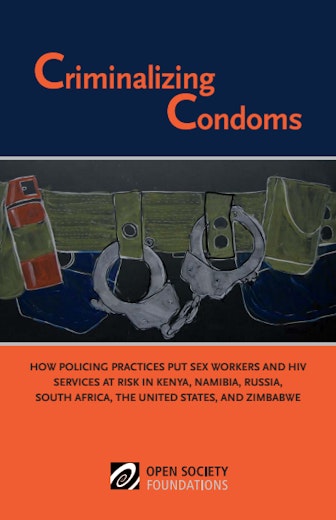Criminalized Condoms Force China’s Sex Workers to Make a Difficult Choice
By Marc Krupanski

Shasha, a transgender sex worker in China, was stopped on the street one night by the police. Though she hadn’t conducted any business that night, she was hauled to a local precinct for questioning. Once there, the police searched her bag and found lubricant and condoms. Declaring them evidence of guilt, she was immediately sent to a detention center and held for 15 days.
This scenario is all too typical in China, where law enforcement officers routinely seize condoms as evidence of illegal sex work, according to a new report issued this month by Asia Catalyst. The result of this practice is as harmful as it is predictable: sex workers, fearing prosecution, are less likely to carry condoms, increasing their risk of contracting HIV and other sexually transmitted infections.
Globally, sex workers remain one of the key at-risk populations for HIV. In China, 104,000 new cases of HIV were diagnosed in 2014, and 92.2 percent of these were contracted through sexual contact.
The first-of-its-kind research in China was conducted over the course of a year and involved 517 male, female, and transgender sex workers in three major Chinese cities. Among the report’s findings was a 21 percent decrease in the consistent use of condoms among sex workers who have experienced police interrogation versus those who have not.
In 2012, the Open Society Foundations issued a six-country report, Criminalizing Condoms, that documents the legal and illegal confiscation of condoms by police and the impact on sex workers’ lives and health. The report—which included research in Kenya, Namibia, Russia, South Africa, the United States, and Zimbabwe—found that more than 40 percent of sex workers reported police seizure of condoms and that, as a result, they were more likely to have unprotected sex with clients.
In many places, police consider the mere possession of condoms to be a “tool of offense” that provides tangible evidence of illegal activity. Not only are condoms seized and introduced into criminal proceedings, but they have also been used by police to extort money from sex workers, clients, or third parties, and to demand sex themselves. Transgender and gender-nonconforming people have also been profiled as sex workers for possessing condoms and face harassment, detention, and abuse as a result.
In addition to showing that condom seizure leads to higher risk of HIV, the report also details how police often use possession of condoms to justify violence and abuse of alleged sex workers, including verbal humiliation, physical violence, and extortion. These repressive tactics have not resulted in sex workers leaving the industry but rather a decrease in the legitimacy of, and trust in, police and government authorities among sex workers.
Incredibly, such law enforcement practices directly conflict with the work of other government agencies—a self-defeating dynamic repeated in countries around the world. In China, for instance, even as the police use condoms as evidence of criminality, the National Health and Family Planning Commission is focused on condom distribution, including at hotels and other venues where sex work occurs.
The distribution of condoms by Chinese health authorities represents an important and progressive approach to contain HIV risk among key populations—an approach that has been undermined by police seizures. Meanwhile, in New York City, the Health Department has distributed free condoms with packaging branded with the city’s logo, only to see those condoms later seized by police.
The treatment of condoms as contraband or evidence of illegal activity is an issue that has concerned the Open Society Foundations for a number of years. We have supported several initiatives to work with law enforcement, health practitioners, and community advocates to stop a practice that only makes people less safe and less healthy. Among these initiatives is a board game, Cops & Rubbers, designed to demonstrate the real consequences of these policing tactics.
But the criminalization of condoms speaks to an even more troubling problem around the world: the criminalization of particular populations and the negative impacts of utilizing law enforcement for issues related to public health. Time and time again, whether in relation to sex workers as detailed in the Asia Catalyst report, or as seen elsewhere with people who use drugs or people with mental health problems, use of police as a primary or principle agent exacerbates the problem.
As resources are cut for health and social services, police often become the answer for everything. This puts the police in an untenable situation—one that many police themselves increasingly recognize and want to change.
In the long term, police departments should train their officers in HIV-related matters, and reorient their strategies to support public health and human rights–based interventions. But well before that, simpler steps can be taken. First and foremost, police forces in China and elsewhere need to end the seizure of condoms as evidence of wrongdoing—an easy fix that could have profound and positive impact.
Until September 2021, Marc Krupanski was a senior program officer for the Open Society Public Health Program.


